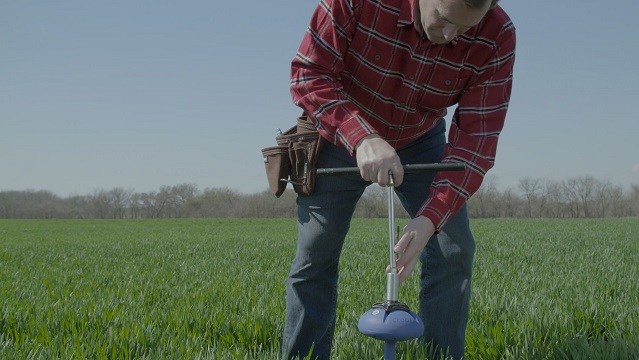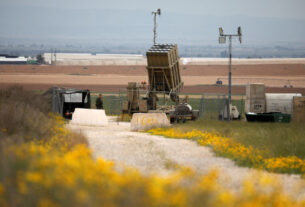NASA Teams with Israel’s Agro-Tech Company
The new arrangement will give NASA Harvest unprecedented soil insights for its global agricultural monitoring efforts.
NASA Harvest (NASA’s Food Security and Agriculture Program) and CropX, an Israeli firm which specializes in soil analytics for agriculture, have entered into a strategic partnership. The new arrangement will give NASA Harvest unprecedented soil insights for its global agricultural monitoring efforts. Supporting a more sustainable food ecosystem, together NASA Harvest and CropX will provide farmers and industry experts with the data and information they need to improve farming sustainability by conserving resources and improving crop yields.
CropX boasts that it is revolutionizing the farm and automating the decision-making process by combining above-ground data sets with real-time soil data. CropX gives farmers a connection to their soil, offering proprietary soil sensor technology and cloud-based Ag analytics that integrate with irrigation systems.
Israel may now be known more as Startup Nation for all of its success in the high tech world. But until recently it was best known for its agricultural innovations. The pioneers of early Israel famously drained swamps, planted orange groves (oranges are not indigenous to the Middle East) and irrigated deserts to grow all sorts of crops. Israel was so successful at this that the country early on sent experts to help third world nations in Africa develop their own agriculture.
Nowadays Israelis have combined their country’s history of agricultural innovation with its high tech innovation. The country finds ways to deal with the world’s water and food production problems while offsetting the problems with animal waste and carbon emissions. Redefine Meat is one of a number of Israeli startups moving forward in providing the technology necessary to give the world viable meat alternatives. It does so by way of 3D printing technology. Israeli startup The Mediterranean Food Lab develops12 natural plant-based flavor bases for the alternative meat sector.
Founded in 2015, the company boasts that its CropX system is affordable, easy-to-install, and helps farmers sustainably increase crop yield and quality by significantly reducing water, fertilization and energy usage and costs, while minimizing runoff and waterway pollution. CropX has demonstrated over 40% water savings across different crop types, and measured yield increases over 10%.
The partnership will further NASA Harvest’s mission to improve food security and advance sustainable agriculture, supporting farmer productivity while preserving natural resources in the United States and worldwide through the use of satellite data. Combining the power of CropX soil data monitoring, comprehensive insights provided by the CropX ag analytics platform, and NASA’s network of Earth-observing satellites, NASA Harvest aims to deliver critical insights to governments and farmers around the globe in support of informed and science-driven decision making.
“Soil health and nutrient management is at the very root of food security and sustainable agriculture concerns – an accurate understanding of what is actually happening underneath the ground is essential,” noted Nadav Liebermann, CropX chief technology officer. “Satellite imagery has long been an integral part of CropX algorithms, and our partnership with NASA Harvest will deliver valuable agronomic insights by connecting critical data at different depths underground and from an expansive network of satellites in space. We are looking forward to working with the NASA Harvest team to improve farming decision-making worldwide – in both developed and undeveloped regions.”
CropX has implemented strategies across a group of alfalfa farms in Arizona controlled by IAF Investments Group to test and finetune the algorithms that will become the foundation of nationwide, and potentially eventually global, agriculture insights. Over a 12-month time period with the integration of NASA data and international partner agency satellite data, the pilot program will quickly establish the parameters for water usage estimates, yield prediction, soil quality and land usage assessments based on multiple crop growing cycles.
“We are delighted to collaborate with CropX and NASA Harvest on this most important deployment,” stated Jon-Michael Nahon, IAF senior managing partner, “Optimal and sustainable use of farm inputs is crucial to meeting the world’s food challenge.” Particularly in light of a renewed focus on soil moisture metrics spurred by NASA’s NISAR mission, the team hopes to build upon the pilot study in the coming years by using the best available technology to analyze and support more cost-effective and environmentally efficient farming methods.
“We are in a constant race to produce and supply enough food in order to feed a rapidly growing global population, with finite land and natural resources. NASA Harvest is dedicated to collaborating with top innovators to make the best possible use of our agricultural land; CropX unites our space-led vision with on-farm intelligence and results,” added Inbal Becker-Reshef, program director of NASA Harvest.
“We were impressed by the accuracy and reliability with which the CropX soil monitoring platform was able to both pinpoint various soil health and environmental challenges, as well as determine opportunities for water, energy and nutrient conservation,” Becker-Reshef said. “CropX offers the advanced tools and global farm footprint needed to understand and improve soil health and water quality tied to farming ecosystems around the world. Paired with satellite data, this provides the opportunity to scale these insights in support of farmer productivity and more effective use of available resources.”
–
Very excited to share that CropX has developed access to comprehensive data insights about fertilizer movements and precise salt levels in their fields to guide more efficient fertilizer application and management!https://t.co/Yk17A1AgA3 pic.twitter.com/cbBwyni9EF
— Cropx (@crop_x) March 12, 2021
First introduced via their involvement in Farm2050, an ecosystem of agrifood industry leaders led by the private companies Innovation Endeavors and Finistere Ventures, the new partnership between CropX and NASA Harvest puts collaboration across the public, private and academic sectors into practice. A multidisciplinary consortium led by the University of Maryland, NASA Harvest is dedicated to creating the partnerships needed to unlock innovation in agriculture. Together, NASA Harvest and CropX plan to quickly scale the program based on learnings from the initial pilot.
About NASA Harvest
Housed within the NASA Applied Sciences Program, NASA Harvest is NASA’s Food Security and Agriculture Program operating as a consortium of leading agricultural experts across the academic, public, private, and NGO sectors. Led by researchers at the University of Maryland and implemented with the support of international partners, NASA Harvest serves to advance the use of satellite Earth observations to benefit both domestic and global food security and environmental resiliency. As a consortium of over 50 partner organizations from across the globe, the NASA Harvest team leverages a vast and diverse array of agricultural remote sensing expertise, food market analysis, and sustainable agriculture knowledge in service of food security worldwide.




